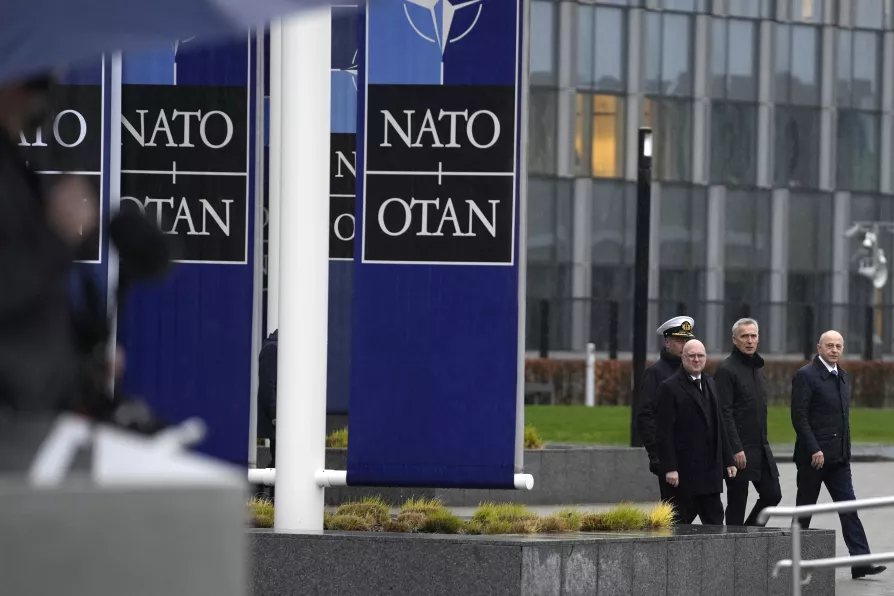
 NATO Secretary General Jens Stoltenberg, second right, arrives for a wreath laying ceremony at NATO headquarters in Brussels, April 4, 2024
NATO Secretary General Jens Stoltenberg, second right, arrives for a wreath laying ceremony at NATO headquarters in Brussels, April 4, 2024
NATO secretary-general Jens Stoltenberg beats a familiar drum when he claims an “alliance of authoritarian powers” is targeting the West.
His aim is to secure public consent to the militarisation of Europe, and to rising military spending at a time when working-class living standards are falling and public services failing across the continent.
The Nato alliance accounts for 75 per cent of all military spending worldwide — there is no justification for further increases, and no case that other countries present a threat to Nato. Nor can we ignore the jingoist extremism being promoted across Europe, such as demands from Baltic states Latvia and Estonia that we reintroduce conscription — suggestions given credence by British top brass such as General Sir Patrick Sanders.
The war lobby are on the back foot. Outrage at Israel’s Gaza genocide, armed and supplied by Western powers including Britain via the RAF bases on Cyprus, has spurred a mass peace movement on a scale not seen for 20 years.
If Britain’s role in arming Israel undermines claims that the arms industry is either benign or defensive, its diplomatic support for the war has even wider ramifications. That support continues, as Deputy Prime Minister Oliver Dowden emphasised today with his assertion that Israel’s brutal war against a territory it has held under an illegal and suffocating siege for 17 years remains legitimate even if ministers have “concerns” at some of the horrific things its army is doing.
Britain has belatedly backed a ceasefire vote at the United Nations, but it is obvious to everyone that it was forced into that position against its will by a combination of the huge street movement and increasing international isolation.
With the eyes of the public (and the world) on every development in the war and at the UN, people will not forget that Britain was still abstaining on ceasefire resolutions in February — when every other UN security council member bar the United States supported one.
The leaders of the so-called “free world” have been exposed blocking the near-unanimous will of UN member states, and in the cause of facilitating an ongoing bloodbath. Their contempt for international law has been in public view, given their efforts to undermine the credibility of the genocide case brought to the International Court of Justice by South Africa.
That makes it much more difficult to present the West as guarantors of a “rules-based system” which is supposedly threatened by adversarial countries, most notably Russia and China. These two, along with Iran and North Korea, are named by Stoltenberg as being “increasingly aligned” in an anti-West alliance.
There is an element of common cause, naturally enough, between countries repeatedly slapped with unlawful sanctions by the US and its allies (and sanctions not endorsed by the UN security council have no international legal weight).
Washington’s outrage that Russia, a country it has subjected to multiple economic sanctions, is breaching other sanctions it has imposed on North Korea reeks of American exceptionalism, as does its ludicrous attempt to discourage trade between Russia and China when it continues to try to wreck the economies of both.
This is nothing new — the United States has long stooped to straightforward piracy to enforce its prohibitions on trade between sovereign third countries, including through seizing Iranian oil at sea en route to Venezuela, and Chinese medical supplies bound for Cuba during the Covid pandemic. But the mask — carefully fashioned by misleading reportage treating unlawful economic warfare as some form of legitimate law enforcement by the World Policeman — is slipping.
That is a context in which the peace movement can and must hit back against the militarist tide.

In an address to the Communist Party’s executive at the weekend international secretary KEVAN NELSON explained why the communists’ watchwords must be Jobs not Bombs and Welfare not Warfare













